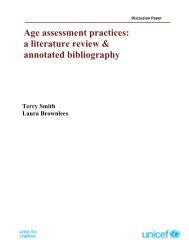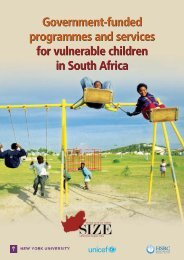Third and Fourth Periodic Report on CRC - Unicef
Third and Fourth Periodic Report on CRC - Unicef
Third and Fourth Periodic Report on CRC - Unicef
Create successful ePaper yourself
Turn your PDF publications into a flip-book with our unique Google optimized e-Paper software.
C<strong>on</strong>venti<strong>on</strong> <strong>on</strong> the Rights of the Child<br />
BEHTRUC project <str<strong>on</strong>g>and</str<strong>on</strong>g> its successor project for the urban working children under MoPME, is being implemented<br />
in the six Divisi<strong>on</strong>al cities (346,500 children benefited from the project <str<strong>on</strong>g>and</str<strong>on</strong>g> the <strong>on</strong>-going <strong>on</strong>e has a target of<br />
200,000 working children); 44 Shishu Kalyan (child welfare) Trust schools have been providing primary<br />
educati<strong>on</strong> to the street children. This project mainly focuses <strong>on</strong> rehabilitati<strong>on</strong> of street children.<br />
Protecti<strong>on</strong> of Children at Risk (PCAR) project MoSW/DSS, funded by UNICEF, through 13 different activities,<br />
covering groups of children without parental care, provides basic educati<strong>on</strong>, skills training <str<strong>on</strong>g>and</str<strong>on</strong>g> basic healthcare.<br />
NGOs work both in partnership with the Government’s child labour projects <str<strong>on</strong>g>and</str<strong>on</strong>g> are also involved <strong>on</strong> their own<br />
in n<strong>on</strong>-formal educati<strong>on</strong>, formal primary educati<strong>on</strong>, skills training, child labour <str<strong>on</strong>g>and</str<strong>on</strong>g> WFCL <str<strong>on</strong>g>and</str<strong>on</strong>g> brothel children.<br />
The Department of Labour (DoL) with the participati<strong>on</strong> of 42 NGOs/CBOs <str<strong>on</strong>g>and</str<strong>on</strong>g> local government instituti<strong>on</strong>s has<br />
established the Child Labour Eliminati<strong>on</strong> Acti<strong>on</strong> Network (CLEAN), to m<strong>on</strong>itor situati<strong>on</strong> c<strong>on</strong>cerning hazardous<br />
child labour in 8 north- west districts of Bangladesh.<br />
8.4.2 Drug abuse<br />
Bangladesh is a party to the following internati<strong>on</strong>al c<strong>on</strong>venti<strong>on</strong>s <strong>on</strong> this subject:<br />
Single C<strong>on</strong>venti<strong>on</strong> <strong>on</strong> Narcotic Drugs 1961(as amended by Protocol of 1972)<br />
C<strong>on</strong>venti<strong>on</strong> <strong>on</strong> Psychotropic Substances 1971<br />
C<strong>on</strong>venti<strong>on</strong> against Illicit Traffic in Narcotic Drugs <str<strong>on</strong>g>and</str<strong>on</strong>g> Psychotropic Substances<br />
The relevant domestic legislati<strong>on</strong> is the Narcotics C<strong>on</strong>trol Act 1990, which punishes drug abuse <str<strong>on</strong>g>and</str<strong>on</strong>g> illicit drug<br />
trafficking with a minimum impris<strong>on</strong>ment sentence of 6 m<strong>on</strong>ths <str<strong>on</strong>g>and</str<strong>on</strong>g> a fine. The Children Act, 1974 makes it a<br />
punishable offence to:<br />
Give intoxicating liquor or dangerous drugs to a child in a public place; <str<strong>on</strong>g>and</str<strong>on</strong>g><br />
Take a child to, or permit a child to enter a place where intoxicating liquor or dangerous drugs are sold.<br />
Accurate rates of drug abuse am<strong>on</strong>g children are not available. However, children are involved as drug carriers,<br />
sellers <str<strong>on</strong>g>and</str<strong>on</strong>g> users.<br />
The Department of Narcotics C<strong>on</strong>trol has overall resp<strong>on</strong>sibility for c<strong>on</strong>trolling the trafficking <str<strong>on</strong>g>and</str<strong>on</strong>g> abuse of drugs<br />
in Bangladesh. The United Nati<strong>on</strong>s Drug C<strong>on</strong>trol Programme (UNDCP) is supporting Government’s anti-drug<br />
efforts in three areas: law enforcement, preventive educati<strong>on</strong> <str<strong>on</strong>g>and</str<strong>on</strong>g> informati<strong>on</strong> <str<strong>on</strong>g>and</str<strong>on</strong>g> treatment/rehabilitati<strong>on</strong>.<br />
8.4.3 Sexual exploitati<strong>on</strong> <str<strong>on</strong>g>and</str<strong>on</strong>g> sexual abuse<br />
The Government is c<strong>on</strong>cerned about the problem of child sexual abuse <str<strong>on</strong>g>and</str<strong>on</strong>g> sexual exploitati<strong>on</strong>. It was<br />
expressed in formulati<strong>on</strong> of the Nati<strong>on</strong>al Plan of Acti<strong>on</strong> against Sexual Abuse <str<strong>on</strong>g>and</str<strong>on</strong>g> Exploitati<strong>on</strong> of Children,<br />
including Trafficking (NPA-SAECT). The Government as well as people in leading positi<strong>on</strong>s are c<strong>on</strong>vinced of the<br />
benefits of ensuring children’s participati<strong>on</strong> for effective policy development <str<strong>on</strong>g>and</str<strong>on</strong>g> implementati<strong>on</strong>. The NPA-<br />
SAECT was developed through a participatory process in c<strong>on</strong>sultati<strong>on</strong> with different stakeholders including<br />
children <str<strong>on</strong>g>and</str<strong>on</strong>g> young people.<br />
A regi<strong>on</strong>al strategy to combat child sexual abuse <str<strong>on</strong>g>and</str<strong>on</strong>g> sexual exploitati<strong>on</strong> of children was adopted by all seven<br />
South Asian Countries in Dhaka. The Strategy was presented by the Government of Bangladesh during the<br />
Sec<strong>on</strong>d World C<strong>on</strong>gress against Commercial Sexual Exploitati<strong>on</strong> of Children in Japan.<br />
The Government has enacted The Suppressi<strong>on</strong> of Violence against Women <str<strong>on</strong>g>and</str<strong>on</strong>g> Children Act, 2000 to protect<br />
the children from sexual exploitati<strong>on</strong> <str<strong>on</strong>g>and</str<strong>on</strong>g> abuse.<br />
89
















